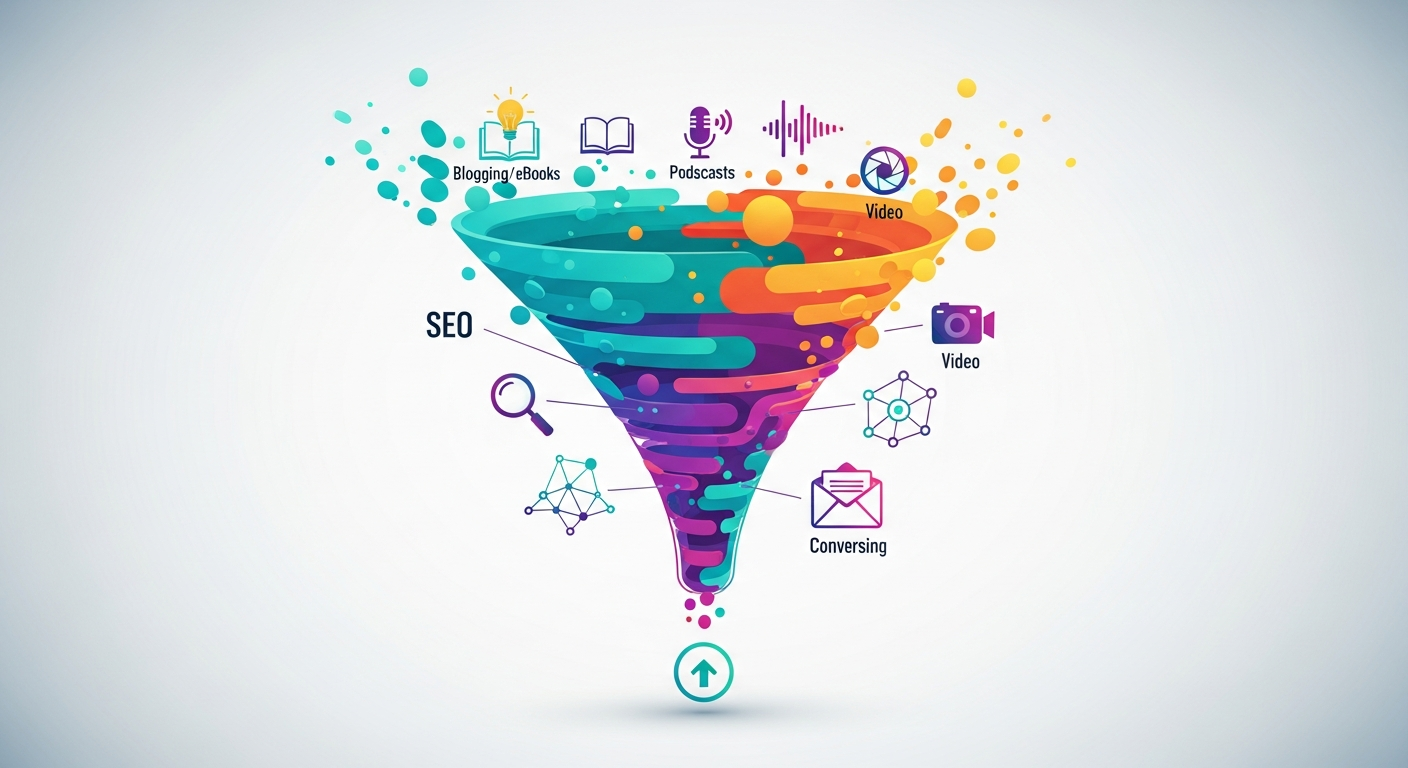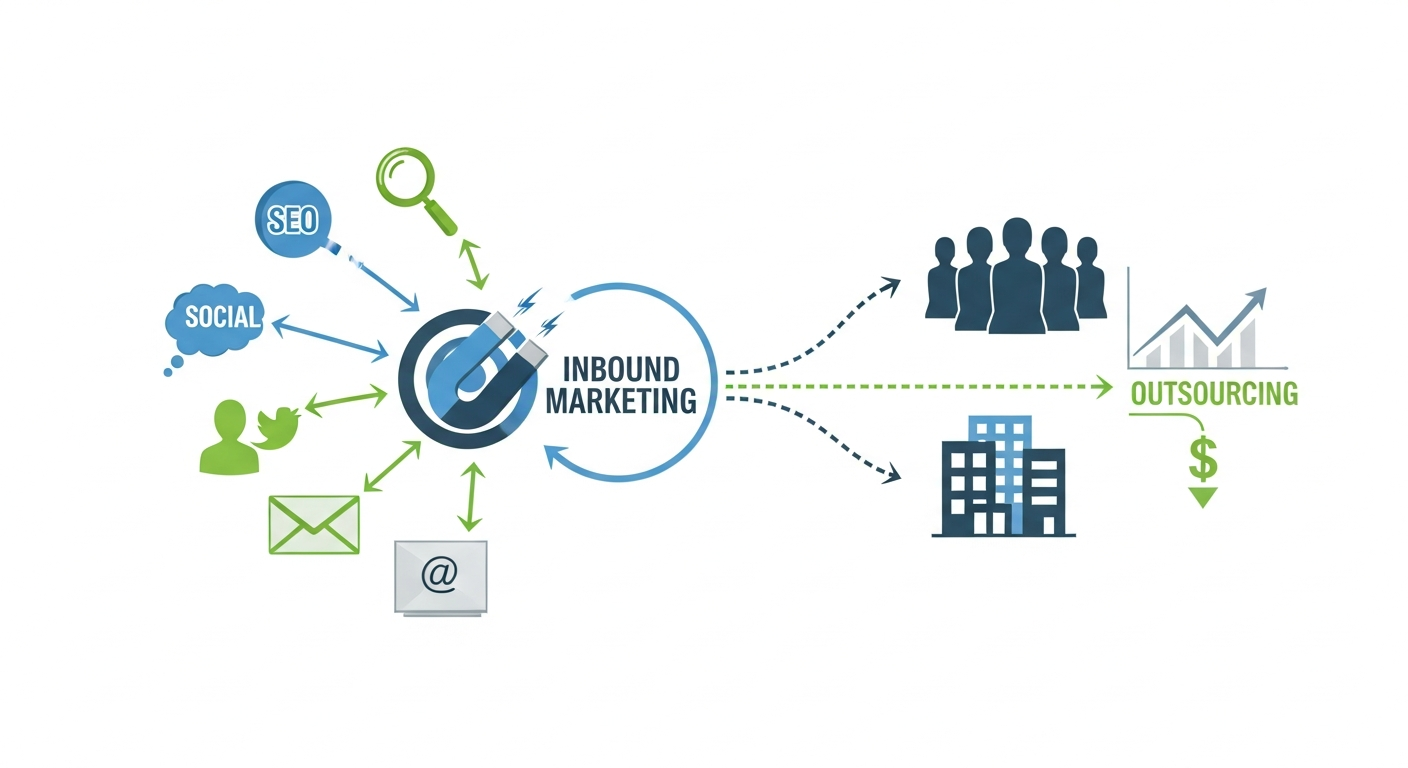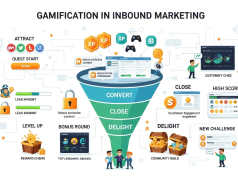Outsourcing inbound marketing helps businesses scale faster, access expert skills, and maintain consistent performance without expanding internal teams. By partnering with the right agency, companies improve lead generation, content quality, and ROI while focusing on core priorities. Strategic oversight ensures outsourcing becomes a growth accelerator, not a risk.
Your marketing team is stretched thin. Leads are trickling in at a frustrating pace. Meanwhile, your competitors seem to have endless content flowing across every channel.
Sound familiar? You’re not alone. Many businesses reach a point where they must decide: should we outsource inbound marketing, or keep everything in-house?
This decision can make or break your growth trajectory. Get it right, and you’ll accelerate lead generation while freeing up internal resources. Get it wrong, and you might lose brand control, overspend, or worse—see your marketing efforts fall flat.
What Is Inbound Marketing?

Before diving into outsourcing decisions, let’s clarify what inbound marketing actually involves.
Inbound marketing attracts customers through valuable content and experiences tailored to their needs. Rather than interrupting prospects with ads, you draw them in with helpful resources, engaging social media, and search-optimized content.
The core components include:
- Content creation (blog posts, videos, infographics)
- Search engine optimization (SEO)
- Social media marketing
- Email marketing
- Lead nurturing campaigns
- Marketing automation
- Analytics and reporting
Each piece requires specialized skills, consistent execution, and ongoing optimization. That’s where the outsourcing question becomes relevant.
Signs It’s Time to Outsource Inbound Marketing
Your Team Lacks Specialized Skills
Inbound marketing demands expertise across multiple disciplines. Your sales manager might write decent emails, but do they understand keyword research, conversion optimization, or marketing automation workflows?
If your team struggles with technical SEO, can’t create compelling video content, or doesn’t know how to set up lead scoring systems, outsourcing could fill these gaps faster than hiring and training new employees.
You’re Missing Deadlines and Opportunities
Consistency drives inbound marketing success. Search engines favor websites that publish fresh content regularly. Email subscribers expect timely, relevant messages. Social media algorithms reward accounts that post consistently.
When your team constantly pushes content deadlines, skips email campaigns, or goes weeks without social media posts, you’re losing momentum. An external agency can provide the bandwidth needed to maintain consistent output.
Your Results Have Plateaued
Perhaps your team executes the basics well—they publish blog posts, send newsletters, and post on social media. But if your metrics have flatlined for months, you might need fresh perspectives and advanced strategies.
Experienced agencies bring insights from working with dozens of clients across industries. They’ve seen what works, what doesn’t, and how to adapt strategies for different market conditions.
You Need Faster Scaling
Internal hiring takes time. Posting jobs, interviewing candidates, onboarding new team members, and getting them up to speed can take three to six months. During that time, opportunities slip away.
Outsourcing lets you scale marketing efforts immediately. Established agencies have teams ready to start working on your campaigns within days, not months.
Budget Constraints Make Full-Time Hires Impossible
Hiring a full-time content manager, SEO specialist, and social media manager could cost $180,000+ annually in salaries alone. Add benefits, training, and tools, and you’re looking at $250,000 or more.
Many agencies offer comprehensive inbound marketing services for $5,000-$15,000 monthly. You get access to an entire team of specialists for less than one full-time employee’s total cost.
When Outsourcing Might Not Be Right
Your Product Requires Deep Technical Knowledge
If you’re selling complex software, industrial equipment, or specialized professional services, external marketers might struggle to create authentic, technically accurate content.
A cybersecurity company, for example, needs content that demonstrates genuine expertise in threat detection, compliance frameworks, and security protocols. Surface-level content won’t build trust with sophisticated buyers.
Brand Voice Is Critical to Your Success
Some brands succeed because of their unique personality and voice. If your company’s communication style is central to your competitive advantage, outsourcing might dilute that distinctiveness.
Consider whether an external team can truly capture your brand’s essence, or if they’ll produce generic content that sounds like every other company in your space.
You Have Strong Internal Capabilities
If your team already has deep marketing expertise and adequate bandwidth, outsourcing might be unnecessary. Strong internal teams often outperform agencies because they understand your business, customers, and industry dynamics better.
Evaluate your current capabilities honestly. Are you really lacking skills and capacity, or do you just need better processes and tools?
Budget Is Extremely Limited
Quality inbound marketing agencies typically charge $3,000-$15,000 monthly. If your total marketing budget is $2,000 monthly, outsourcing might not be viable.
You might achieve better results investing in marketing tools and training for your existing team.
Types of Inbound Marketing Outsourcing

Full-Service Agencies
These agencies handle your entire inbound marketing strategy. They typically offer content creation, SEO, social media management, email marketing, and analytics reporting.
Pros: Complete solution, integrated strategy, access to diverse expertise
Cons: Higher cost, less control, potential for generic approaches
Specialized Service Providers
You might outsource specific functions while keeping others in-house. Common specialized services include:
- Content writing and creation
- SEO and technical optimization
- Social media management
- Email marketing and automation
- Paid advertising management
- Analytics and reporting
Pros: Targeted expertise, lower cost, maintain control over other areas
Cons: Requires coordination between multiple providers, potential strategy gaps
Freelancers and Consultants
Individual experts can handle specific projects or ongoing tasks. This works well for content writing, graphic design, or strategic consulting.
Pros: Cost-effective, highly specialized skills, flexible arrangements
Cons: Limited bandwidth, no backup if they’re unavailable, requires more management
Hybrid Approaches
Many successful companies combine internal teams with external support. You might have an internal marketing manager who coordinates with outsourced content creators and SEO specialists.
Pros: Maintains internal control while accessing external expertise
Cons: Requires strong project management, potential communication challenges
How to Choose the Right Outsourcing Partner
Evaluate Their Track Record
Request case studies from companies similar to yours. Look for specific results: traffic growth, lead generation improvements, conversion rate increases. Avoid agencies that only share vanity metrics like social media followers.
Ask for references and actually call them. Previous clients can provide insights into working relationships, communication styles, and real results.
Assess Their Understanding of Your Industry
Do they speak your industry’s language? Can they demonstrate knowledge of your competitive landscape, regulatory environment, and customer behaviors?
Generic marketing agencies might produce beautiful content that completely misses your target audience’s needs and preferences.
Review Their Content Quality
Request writing samples relevant to your industry. Evaluate whether their content provides genuine value or reads like keyword-stuffed filler.
Look at their own marketing efforts. If they can’t generate leads and build an audience for their agency, how will they do it for you?
Understand Their Process
How do they develop strategies? What tools do they use? How do they measure success? How often do they report results?
Clear processes indicate professionalism and reduce the likelihood of miscommunication or missed expectations.
Consider Communication Style
You’ll work closely with this team. Do they respond promptly to questions? Do they explain strategies clearly? Do they seem genuinely interested in your success?
Poor communication causes most agency relationships to fail, regardless of technical capabilities.
Making the Transition Smooth
Start With a Pilot Project
Rather than handing over your entire marketing operation, begin with a specific project or campaign. This allows you to evaluate their capabilities and working style before making a larger commitment.
Provide Comprehensive Background Information
Share detailed information about your target audience, brand guidelines, competitive landscape, and past marketing efforts. The more context you provide, the better results you’ll achieve.
Establish Clear Expectations
Define success metrics upfront. What constitutes success after three months? Six months? One year? How often will you review performance? What happens if results don’t meet expectations?
Maintain Some Internal Oversight
Even with full outsourcing, someone internal should monitor performance, provide feedback, and ensure alignment with business goals.
Plan for Knowledge Transfer
If you decide to bring marketing back in-house eventually, ensure your outsourcing partner documents their strategies, maintains organized asset libraries, and can transfer knowledge smoothly.
Strategic Benefits of Outsourcing Inbound Marketing
Outsourcing inbound marketing gives businesses immediate access to a full team of specialists without the delays and costs of hiring internally. Agencies bring proven frameworks, refined processes, and cross-industry insights that accelerate results. Instead of experimenting through trial and error, companies benefit from strategies already tested in real markets. Outsourcing also improves focus—internal teams can concentrate on core business operations while experts handle lead generation, content, and optimization. For growing companies, this strategic leverage often translates into faster pipeline growth, better content quality, and improved marketing ROI. When managed correctly, outsourcing becomes a growth multiplier rather than a cost center.
Long-Term Cost Efficiency
While outsourcing may seem expensive initially, it often proves more cost-effective long term. Hiring, training, retaining, and managing a full inbound team is costly and time-intensive. Agencies spread expertise across clients, lowering per-business costs. Additionally, improved performance and faster growth offset agency fees. When measured against results—not just expenses—outsourcing frequently delivers stronger ROI than in-house-only models.
The Bottom Line on Outsourcing Inbound Marketing

Outsourcing inbound marketing can accelerate your growth, provide access to specialized expertise, and free up internal resources for other priorities. However, it’s not a magic solution that works for every business.
The decision depends on your specific situation, including your current capabilities, budget constraints, growth timeline, and industry requirements. Companies with limited internal expertise, tight timelines, and adequate budgets often benefit significantly from outsourcing.
Success requires choosing the right partner, maintaining clear communication, and staying involved in strategic decisions. Treat outsourcing as a partnership, not a handoff.
Start by honestly evaluating your current marketing performance and internal capabilities. If you’re struggling with consistency, lacking specialized skills, or missing growth opportunities, outsourcing might be the catalyst your business needs.
The key is moving from wondering “should we outsource?” to “how can we outsource successfully?” That shift in mindset often makes the difference between companies that thrive and those that continue struggling with the same marketing challenges month after month.
Conclusion
Outsourcing inbound marketing is a strategic decision, not a shortcut. When internal resources are stretched, skills are limited, or growth demands speed, outsourcing provides expertise, scalability, and efficiency. The key lies in choosing the right partner, maintaining clear communication, and staying strategically involved. Done right, outsourcing transforms inbound marketing into a predictable, sustainable growth engine.
Frequently Asked Questions (FAQs)
What does it mean to outsource inbound marketing?
Outsourcing inbound marketing means hiring external specialists or agencies to manage some or all inbound activities such as content creation, SEO, email marketing, lead nurturing, and analytics instead of handling everything internally.
Is outsourcing better than in-house marketing?
It depends on your internal skills, budget, and growth goals. Outsourcing offers faster access to expertise and scalability, while in-house teams provide deeper brand familiarity and control.
How long before results appear?
Inbound marketing typically shows measurable results within 3–6 months, depending on competition, strategy execution, and consistency.
Can I outsource only SEO or content?
Yes. Many businesses outsource specific services like SEO, content writing, social media, or marketing automation while keeping strategy in-house.
Is outsourcing suitable for small businesses?
Absolutely. Outsourcing is often ideal for small businesses that lack resources to hire full-time specialists but still need professional execution.
Will I lose brand control?
No. With clear brand guidelines, approval processes, and regular communication, businesses retain full control over messaging and positioning.
How do agencies measure success?
Agencies track KPIs such as website traffic, lead generation, conversion rates, engagement metrics, and overall return on investment (ROI).
Is outsourcing inbound marketing expensive?
In most cases, it’s more cost-effective than building and maintaining a full in-house team, especially when factoring in salaries, tools, and training.
Can outsourced teams understand my industry?
Reputable agencies invest time in research, onboarding, and collaboration to understand your industry, audience, and competitive landscape.
Do I still need internal oversight?
Yes. Internal oversight ensures strategic alignment, timely feedback, and that marketing efforts support overall business goals.
Can outsourcing scale with my growth?
Yes. Agencies are built to scale quickly, allowing you to increase or reduce marketing efforts without operational disruption.
Is outsourcing a long-term commitment?
Not necessarily. Outsourcing can be short-term for specific projects or long-term for ongoing growth, depending on your business needs.




